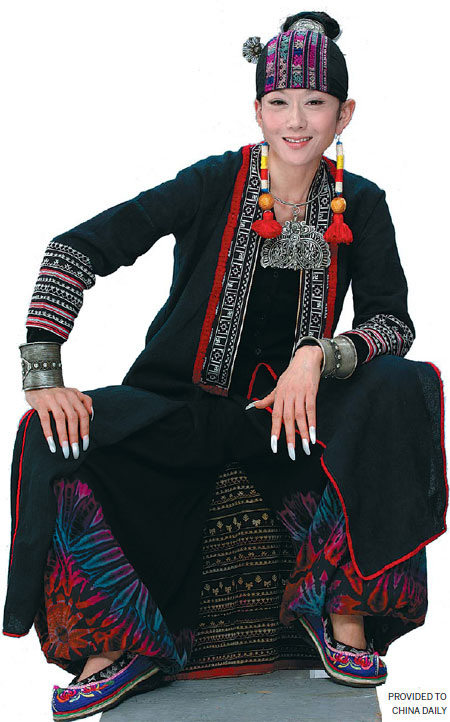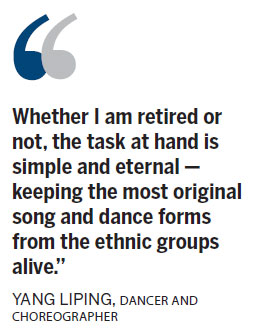Rooting for heritage
Updated: 2012-04-11 06:53
By Chen Nan (China Daily)
|
||||||||


Yang Liping, a celebrated dancer-choreographer of Bai ethnicity, has made it her mission to preserve things that seem out of date and has founded a school to that end. Chen Nan reports in Beijing.
Dancer and choreographer Yang Liping, from the Bai ethnic group, made a fashion statement at a Ferrari auto show in Yunnan province's capital Kunming. Instead of a regular, or designer purse, she was seen carrying a bamboo basket, an accessory favored by Bai women.
"Many women in my village carry such a basket," says Yang, who is from Yunnan province.
"It's much more convenient than a handbag," she continues, picking out a tissue from the basket. "I don't own anything made by designers. I wear clothes and accessories made by ethnic craftspeople. I speak the dialect spoken in my village."
Yang, 54, wore a tight blue top and loose red pants, made from a quilt cover. Her waist-length hair was tied up in a ponytail.
Yang says she never consciously dresses up like a fashionista, whatever the occasion. She is amused when people call her a fashion icon.
"I just love everything from the village where I come from. Some people might say that my preference for rural things, including clothes and living habits, are very tu (out of date). But in my eyes, they are treasures," she says.
She now devotes herself to handing down some of these very tu traditions to younger generations. She has also founded a school in Kunming to teach the traditional singing and dancing practiced by the ethnic groups.
The school, called Dynamic Yunnan Art Inheritance Center, is a realization of Yang's long-cherished dream. She had been scouting for veteran folk artistes - musicians, dancers, singers and craftsmen - in the remote villages inhabited by ethnic groups for years. The chosen ones will work as teachers in Yang's school, handing down their skills, most of which are on the verge of extinction. The students, who are from poor villages inhabited by ethnic groups across China, are given free tuition at Yang's school.
Yunnan is the country's most ethnically diverse province. However, the villages, which are often wedged between mountains, are fast catching up with the general economic development, leading to the inevitable decline of traditional lifestyle practices.
"Their natural aptitude for song and dance is decaying," Yang says.
"Our folk artists are already in their 70s and 80s. They inherited their skills from the earlier generations and these need to be preserved. I hope that young people can learn the art forms and pass them on."
Yan Bin, 64, of the Va ethic group, is one of the musicians invited to teach at Yang's school. He can play nearly 100 instruments, from a leaf to a flute, all self-handcrafted. Residents of Ximeng Va autonomous county, in Pu'er city, Yan and his elder brother Sui Ga were discovered by Yang and the late musician Tian Feng, 10 years ago.
"Singing and dancing are related to every aspect of our culture. We sing and dance to mark every event - be it a birth, a marriage, a death, or building a new house. However, the tradition is dying fast," he says.
Nearly 200 students have enrolled in Yang's school, from across the 25 ethnic groups in the province. After the first semester, Yang will pick some of them to perform in her dance troupe. "I am glad to see that the students are not just here for free education, but have a passion for singing and dancing," she says.
Xia Ga, 30, from the Hani ethnic group, got a lot of attention when he performed the drum dance at Yang's Dynamic Yunnan show.
"All my family members are farmers. Yang has opened up a new world for me," says Xia Ga, who wears his hair traditional style, typical of his village - a shaven forehead with a short pigtail.
Since Yang won the first prize in a national dance competition in 1986, she has been a household name. She wowed audiences with her signature dance, Spirit of the Peacock, and was nicknamed Peacock Princess.
The show, Dynamic Yunnan, which has been performed more than 3,000 times around the world, turned Yang into an iconic figure of Yunnan province and an internationally acclaimed dancer-choreographer. Experts say Yang has not only developed a highly personal style, but has played a significant role in popularizing Yunnan's folk dances as well.
"Most dancers are trained to dream of being on stage and in the limelight. I just love dancing. It's in my body and nature. I dance for the people in my village and also for myself," Yang says.
The dance, Love of Peacock, which was performed by Yang at the CCTV Spring Festival Gala in January 2012, proved that even in her 50s, Yang can dance like a spirited youth, contorting her slender frame and using her arms, legs and fingers to vividly emulate the movements of the bird.
The costumes are elaborate and meticulously sewn together, each taking about three months to finish. "When she put the costume on, she was like a real peacock. On stage, even her fingernails can talk," says Wang Di, 34, one of Yang's fellow dancers in Love of Peacock. He started learning how to dance at 12.
Love of Peacock, Yang says, was not a show designed for the CCTV Spring Festival Gala, but was from her upcoming dance show, Peacock. Its national tour starts in August 2012 at Kunming.
Unlike Dynamic Yunnan and Mysterious Tibet, in which the traditional songs and dances of ethnic groups are presented in their most original form, Yang will combine her own innovations with tradition in Peacock.
"My grandma was the best singer in the village and she told me that dancing was a conversation between the dancer and divinity. Peacock is a totem of the Bai ethnic group. I love imitating the movements of the animal, which is so natural yet unconscious," Yang says.
Her 13-year-old niece, Cai Qi, is regarded as her successor. The slender girl, who wears her hair long, much like Yang, has been dancing with her mentor since she learned to walk.
Cai Qi, who has danced in Dynamic Yunnan and Mysterious Tibet, will play major roles in Peacock.
"The new show will be performed for at least two years. So it's still too early to talk about my retirement," Yang smiles. "Whether I am retired or not, the task at hand is simple and eternal - keeping the most original song and dance forms from ethnic groups alive."
Yang is keen to build a theater, dedicated exclusively to performances from her dance shows.
"A regular theater is not suitable for performing my dances," she says.
"I would like the seats to be made of clay and the ground to have grass growing on it. The audience could be perched on trees or sitting on the ground around a campfire."
Contact the writer at chennan@chinadaily.com.cn

 Relief reaches isolated village
Relief reaches isolated village
 Rainfall poses new threats to quake-hit region
Rainfall poses new threats to quake-hit region
 Funerals begin for Boston bombing victims
Funerals begin for Boston bombing victims
 Quake takeaway from China's Air Force
Quake takeaway from China's Air Force
 Obama celebrates young inventors at science fair
Obama celebrates young inventors at science fair
 Earth Day marked around the world
Earth Day marked around the world
 Volunteer team helping students find sense of normalcy
Volunteer team helping students find sense of normalcy
 Ethnic groups quick to join rescue efforts
Ethnic groups quick to join rescue efforts
Most Viewed
Editor's Picks

|

|

|

|

|

|
Today's Top News
Health new priority for quake zone
Xi meets US top military officer
Japan's boats driven out of Diaoyu
China mulls online shopping legislation
Bird flu death toll rises to 22
Putin appoints new ambassador to China
Japanese ships blocked from Diaoyu Islands
Inspired by Guan, more Chinese pick up golf
US Weekly

|

|






